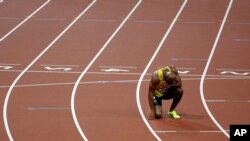The International Olympic Committee president on Monday weighed in on new reports of a decade-long doping scandal saying “we do not have any solid foundation” for the allegations and all athletes should be presumed innocent until the results of an investigation by the World Anti-Doping Agency (WADA).
Global sporting bodies are calling for that investigation to be thorough.
Reports surfaced Sunday that 146 medals, including 55 golds, at the Olympics and at World Championships between 2001 and 2012 were won by athletes with suspicious blood test results.
“The IOC will follow its zero tolerance policy and will do everything to protect the clean athletes,” IOC president Thomas Bach told reporters in Kuala Lumpur.
“Now it's in the hands of WADA as the competent center of both sports and governments to deal with this and we have full confidence in their procedure,” Bach added at his news conference at the conclusion of the Olympic Committee's 128th session.
"These are wild allegations, wide allegations and we will check them out," WADA chief Craig Reedie told journalists at the IOC meeting, adding that the reports, aired by a German broadcaster and published in a British newspaper, “once again, shake the foundation of clean athletes worldwide."
WADA is an independent investigation agency funded by sporting organizations and governments.
Leaked Blood Tests Ignite Controversy
The president of the International Association of Athletics Federations, Lamine Diack, told IOC members on Monday that behind the doping abuse report is a campaign to redistribute medals.
Russia's sports minister, Vitaly Mutko, also suggests there may be an ulterior motive behind the allegations.
Athletics Kenya said it was considering legal action against Germany's ARD and The Sunday Times in Britain, which said they obtained access from a whistleblower to the results of 12,000 blood tests from 5,000 athletes in the IAAF database.
More than 800 of the athletes recorded one or more "abnormal" test results, defined as a result that had less than one chance in 100 of being natural, according to the broadcaster and the newspaper.
Russian athletes had by far the most suspicious results, followed distantly by Ukraine, Morocco, Spain, Kenya, Turkey and others.
U.S. and Australian sporting officials, attending the IOC session in Malaysia, called the allegations disturbing.
Anti-doping scientist Robin Parisotto, who reviewed the data from the 11-year period along with blood doping expert Michael Ashenden, said many athletes appeared to “have doped with impunity, and it is damning that the IAAF appears to have idly sat by and let this happen.”
The IAAF world championships begin in Beijing on August 22.
Smita P. Nordwall in Washington contributed to this report.





